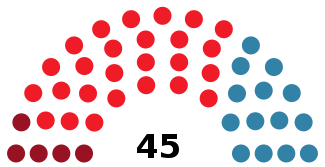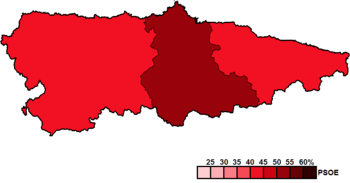Asturian regional election, 1983
| |||||||||||||||||||||||||||||||||||||
All 45 seats in the General Junta of the Principality of Asturias 23 seats needed for a majority | |||||||||||||||||||||||||||||||||||||
| Registered | 873,690 | ||||||||||||||||||||||||||||||||||||
| Turnout | 568,271 (65.0%) | ||||||||||||||||||||||||||||||||||||
| |||||||||||||||||||||||||||||||||||||
|
Constituency results map for the General Junta of the Principality of Asturias | |||||||||||||||||||||||||||||||||||||
| |||||||||||||||||||||||||||||||||||||
The 1983 Asturian regional election was held on Sunday, 8 May 1983, to elect the 1st General Junta of the Principality of Asturias. All 45 seats in the General Junta were up for election. The election was held simultaneously with regional elections in 12 other autonomous communities and local elections all throughout Spain.
The Spanish Socialist Workers' Party (PSOE) won the election with a comfortable absolute majority of 26 out of 45 seats and 52.0% of the vote. The People's Coalition, headed by the conservative People's Alliance, became the second political force and the main opposition party in the General Junta with 14 seats and 30.2%. The Communist Party of Spain (PCE) won 5 seats and 11.1%.
As a result of the election, Socialist Pedro de Silva replaced Rafael Fernández as President of Asturias, becoming the first democratically elected head of the regional government.
Electoral system
The 45 members of the General Junta of the Principality of Asturias were elected using the D'Hondt method and a closed list proportional representation, with a threshold of 5 per 100 of valid votes—which included blank ballots—being applied regionally. Parties not reaching the threshold were not taken into consideration for seat distribution. Seats were allocated to constituencies, which were established by law to comprise the following municipalities:
- Central: Aller, Avilés, Bimenes, Carreño, Caso, Castrillón, Corvera de Asturias, Gijón, Gozón, Illas, Las Regueras, Langreo, Laviana, Lena, Llanera, Mieres, Morcín, Noreña, Oviedo, Proaza, Quirós, Ribera de Arriba, Riosa, San Martín del Rey Aurelio, Santo Adriano, Sariego, Siero, Sobrescobio and Soto del Barco.
- Eastern: Amieva, Cabrales, Cabranes, Cangas de Onís, Caravia, Colunga, Llanes, Nava, Onís, Parres, Peñamellera Alta, Peñamellera Baja, Piloña, Ponga, Ribadedeva, Ribadesella and Villaviciosa.
- Western: Allande, Belmonte de Miranda, Boal, Candamo, Cangas del Narcea, Castropol, Coaña, Cudillero, Degaña, El Franco, Grado, Grandas de Salime, Ibias, Illano, Muros del Nalón, Navia, Pesoz, Pravia, Salas, San Martín de Oscos, Santa Eulalia de Oscos, San Tirso de Abres, Somiedo, Tapia de Casariego, Taramundi, Teverga, Tineo, Valdés, Vegadeo, Villanueva de Oscos, Villayón and Yernes y Tameza.
Each constituency was allocated a fixed number of seats: 32 for the Central District, 5 for the Eastern District and 8 for the Western District.[n 1][1] Voting was on the basis of universal suffrage, with all nationals over eighteen, registered in Asturias and in full enjoyment of all political rights entitled to vote.
The electoral law provided that parties, federations, coalitions and groupings of electors were allowed to present lists of candidates. However, groupings of electors were required to secure at least the signature of 0.1 per 100 of the electors entered in electoral register of the constituency for which they were seeking election—needing to secure, in any case, the signature of 500 electors—. Electors were barred from signing for more than one list of candidates. Concurrently, parties and federations intending to enter in coalition to take part jointly at an election were required to inform the relevant Electoral Commission within fifteen days from the election call.[2]
The regional Statute required for the first regional election to be held between 1 February and 31 May 1983. Additionally, the chamber was to be automatically dissolved and a snap election called if an investiture process failed to elect a regional President within a two-month period from the first ballot, with elected deputies merely serving out what remained of their four-year terms.[1][2]
Opinion polls
Individual poll results are listed in the table below in reverse chronological order, showing the most recent first, and using the date the survey's fieldwork was done, as opposed to the date of publication. If such date is unknown, the date of publication is given instead. The highest percentage figure in each polling survey is displayed with its background shaded in the leading party's colour. In the instance of a tie, the figures with the highest percentages are shaded. in the case of seat projections, they are displayed in bold and in a different font. The lead column on the right shows the percentage-point difference between the two parties with the highest figures. 23 seats were required for an absolute majority in the General Junta of the Principality of Asturias.
| Polling firm/Commissioner | Fieldwork date | Sample size | Turnout | |
|
|
|
Lead |
|---|---|---|---|---|---|---|---|---|
| 1983 regional election | 8 May 1983 | N/A | 65.0 | 52.0 26 |
30.2 14 |
11.1 5 |
3.5 0 |
21.8 |
| Sofemasa/El País[p 1][p 2] | 23–26 Apr 1983 | ? | ? | 49.8 26/29 |
? 12/14 |
? 4/6 |
? 0/1 |
? |
| 1982 general election | 28 Oct 1982 | N/A | 77.6 | 52.1 26 |
27.9 13 |
8.1 4 |
4.3 1 |
24.2 |
Results
Overall
 | ||||||
| Parties and coalitions | Popular vote | Seats | ||||
|---|---|---|---|---|---|---|
| Votes | % | ±pp | Won | +/− | ||
| Spanish Socialist Workers' Party (PSOE) | 293,320 | 51.96 | — | 26 | — | |
| People's Coalition (AP–PDP–UL) | 170,654 | 30.23 | — | 14 | — | |
| Communist Party of Asturias (PCA–PCE) | 62,855 | 11.13 | — | 5 | — | |
| Democratic and Social Centre (CDS) | 19,495 | 3.45 | — | 0 | — | |
| Parties with less than 1.0% of the vote | 15,898 | 2.82 | — | 0 | — | |
|---|---|---|---|---|---|---|
| Workers' Socialist Party (PST) | 4,703 | 0.83 | — | 0 | — | |
| Communist Candidacy (PRUC–PCPE) | 4,226 | 0.75 | — | 0 | — | |
| Asturian Left (MC–LCR) | 2,833 | 0.50 | — | 0 | — | |
| Asturian Nationalist Ensame (ENA) | 2,505 | 0.44 | — | 0 | — | |
| Popular Struggle Coalition (CLP) | 867 | 0.15 | — | 0 | — | |
| Youth Students and Workers (MEyT) | 764 | 0.14 | — | 0 | — | |
| Blank ballots | 2,298 | 0.41 | — | |||
| Total | 564,520 | 100.00 | 45 | — | ||
| Valid votes | 564,520 | 99.34 | — | |||
| Invalid votes | 3,751 | 0.66 | — | |||
| Votes cast / turnout | 568,271 | 65.04 | — | |||
| Abstentions | 305,419 | 34.96 | — | |||
| Registered voters | 873,690 | |||||
| Source(s): General Junta of the Principality of Asturias, SADEI, historiaelectoral.com | ||||||
Distribution by constituency
| Constituency | PSOE | CP | PCA | |||
|---|---|---|---|---|---|---|
| % | S | % | S | % | S | |
| Central | 54.5 | 19 | 27.6 | 9 | 11.6 | 4 |
| Eastern | 43.8 | 3 | 42.3 | 2 | 8.3 | − |
| Western | 42.6 | 4 | 37.2 | 3 | 10.4 | 1 |
| Total | 52.0 | 26 | 30.2 | 14 | 11.1 | 5 |
Notes
- ↑ As no specific electoral law was in force at the time, the electoral system was regulated under the general rules of the Electoral Rules Decree of 1977 and Transitional Provision One of the regional Statute of Autonomy.
Opinion poll sources
- ↑ "Mayoría absoluta del PSOE en las dos elecciones". El País (in Spanish). 1 May 1983.
- ↑ "Ficha técnica de los sondeos". El País (in Spanish). 1 May 1983.
References
- 1 2 Statute of Autonomy for Asturias of 1981, Organic Law No. 7 of December 30, 1981 Official State Gazette (in Spanish). Retrieved on 14 March 2017.
- 1 2 Electoral Rules Decree of 1977, Royal Decree-Law No. 20 of March 18, 1977 Official State Gazette (in Spanish). Retrieved on 27 December 2016.

.jpg)
